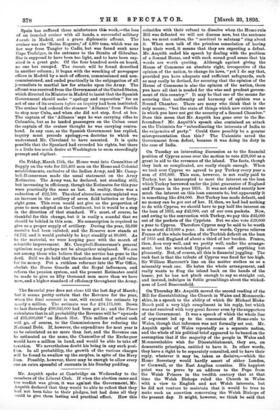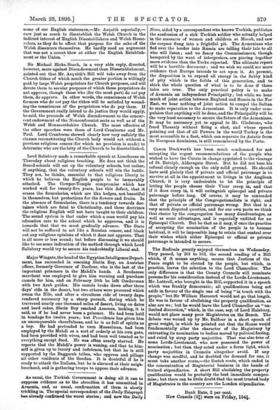On Thursday Mr. Asquith moved the second reading of the
Bill for disestablishing the Church in Wales and Monmouth- shire, in a speech to the ability of which Sir Michael Hicks- Beach paid a very high compliment in his reply, but which was not received with very great favour even by the supporters of the Government. It was a speech of which the whole line- of argument led up to the concession of Home-rule to Wales, though that inference was not formally set out. Mr. Asquith spoke of Wales repeatedly as a separate nation, and the whole of his political brief appeared to be based on the assumption that if the majority of the people in Wales and Monmouthshire wish for Disestablishment, they are, on democratic principles, entitled to have it. In other words, they have a right to be separately consulted, and to have their reply, whatever it may be, taken as decisive,—which the Home Secretary would hardly assert of either London, or Cornwall, or the East Anglian counties. His happiest point was to prove by an address to the Pope from the Welsh Princes in the twelfth century that at that time the Welsh Bishops ruled the Church in Wales with a view to English and not Welsh interests, but he did not venture to maintain that it would be true to make such an assertion concerning the Welsh Bishops of the present day. It might, however, we think be said that
some of our English statesmen,—Mr. Asquith especially,— care just as much to disestablish the Welsh Church in the indirect interest of English Disestablishers and Welsh Home. rulers, as they do to effect that purpose for the sake of the Welsh dissenters themselves. He hardly used an argument that was not a covert blow at either the English Establish- ment or the Union.







































 Previous page
Previous page